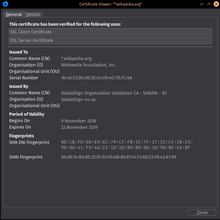Digital certificate
A digital certificate is a digital data set , usually in accordance with the ITU-T or IETF standards , which confirms certain properties of people or objects and whose authenticity and integrity can be checked using cryptographic processes. In particular, the digital certificate contains the data required for its verification. The certificate is issued by an official certification authority , the Certification Authority (CA).
Public-key certificates according to the X.509 standard , which confirm the identity of the owner and other properties of a public cryptographic key , are widely used . Attribute certificates, on the other hand, do not contain a public key, but refer to a public-key certificate and define its scope more precisely. In the context of electronic signatures , the term certificate is interpreted in a more technology-neutral manner (see the section on legal aspects in the article Public-Key Certificates ), so that a certificate does not necessarily have to refer to a cryptographic key, but generally contains data for checking an electronic signature. In practice, however, these are always public key certificates.
Another example of digital certificates are cryptographic checksums on online tickets .
